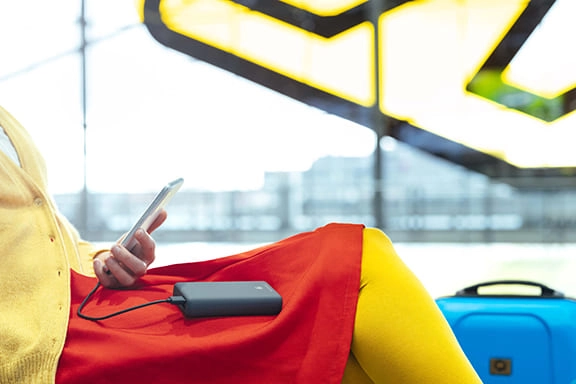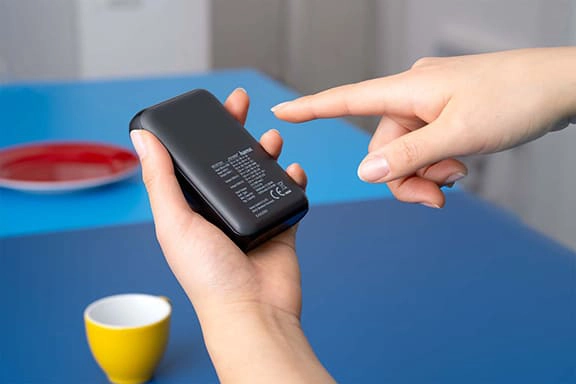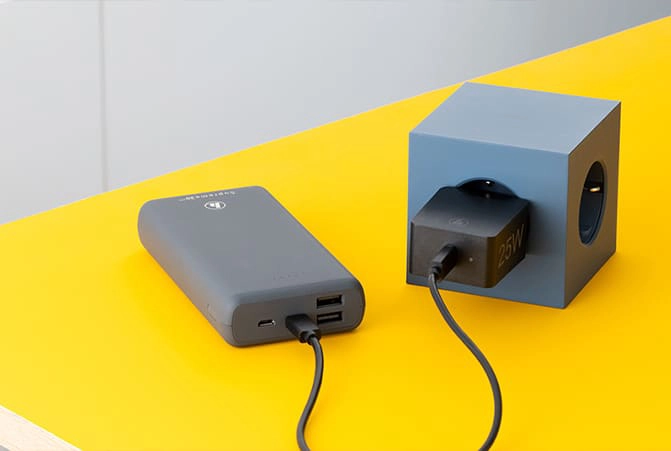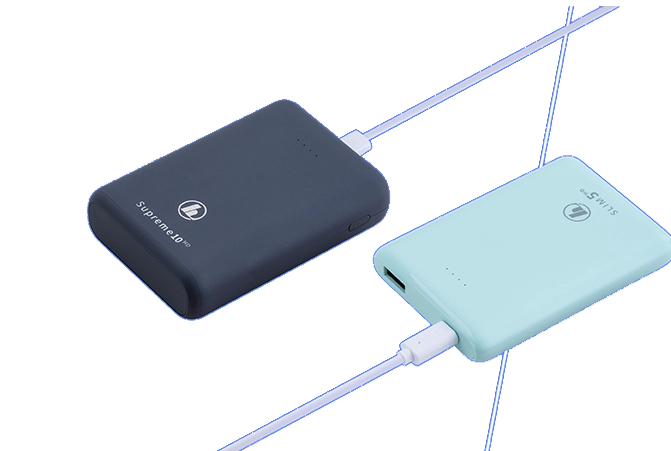Power bank on a plane
You want to know whether you can take a power bank with you on a plane when you travel? Find out all about what you need to bear in mind here.
6 minute timp de citire | Nov 17, 2021
At a glance: Power bank on a plane
- A power bank can only be carried in your hand luggage when flying
- Only power banks with a maximum capacity of 100 Wh or 27,000 mAh are allowed on planes
- If the capacity is not apparent, under no circumstances should you take the power bank through the luggage inspection
- A person is allowed to take a maximum of 2 rechargeable batteries (packaged separately) of 100 Wh each onto a plane in their hand luggage
- The rules for carrying power banks on a plane vary from airline to airline
-
Are you allowed to take a power bank on a plane?
Yes, you are allowed to take a power bank on a plane, but only in your hand luggage for safety reasons. Other requirements: The power bank has a maximum rated power of 100 watt-hours (Wh), a maximum of two power banks of 100 Wh each are permitted per person and these are to be transported separately from each other and packaged individually.
-
What to do with a power bank on a plane: Suitcase or hand luggage?
For safety reasons, a power bank exclusively belongs in your hand luggage on an aeroplane. The lithium-ion rechargeable battery of a power bank could cause a fire due to a short circuit. Even if such an event is exceptionally rare, a fire in the cabin would be detected sooner than in the hold.
-
How many mAh are permitted for a power bank on a plane?
A power bank on a plane is allowed to have a maximum capacity of approx. 27000 mAh (with the usual cell voltage of the rechargeable battery being 3.7 volts). As the permitted capacity for the airlines is generally stated in watt-hours (namely max. 100 Wh), you should convert the mAh information on the housing of your power bank with this formula: mAh x V ÷ 1000 = Wh
-
How many power banks are allowed in your hand luggage?
According to the recommendations of the international flight authority IATA, a maximum of two power banks with 100 Wh each are allowed to be carried per person in hand luggage. However, every airline handles the carrying of power banks somewhat differently and changes the regulations from time to time. So, you should enquire about the current regulations before you travel.
Power bank in a suitcase
Does a power bank belong in your hand luggage or suitcase on an aeroplane? On a plane, power banks are exclusively allowed in your hand luggage, under no circumstances in your check-in hold luggage. Like all devices containing lithium-ion rechargeable batteries, a power bank on a plane represents a greater risk in the event of a fire. If it were in the hold, this would possibly only be discovered when it’s too late.

Power bank in hand luggage
On a plane, you are only allowed to carry a power bank in your hand luggage. You need to pay attention to certain safety regulations relating to battery capacity, quantity and packaging of the power bank.
You are also allowed to use your power bank on the flight to supply your devices with power when working on your laptop or reading on an e-book reader. You’ll also be on the safe side with these tips:
- Find out about the airline regulations in good time before your flight and ideally let the staff at the check-in desk know that you have a power bank in your hand luggage.
- At the security inspection in the airport, remove the power bank from your bag before you place your hand luggage onto the conveyor so that the security team can immediately see the electronic device. This saves time.
Power bank on a plane: Permitted capacity and quantity
Please note that a maximum capacity is allowed for your power bank on a plane. The international flight authority IATA allows power banks with up to 100 Wh (watt-hours) rated power or approx. 27000 mAh (milliampere hours). A person is allowed to take a maximum of two rechargeable batteries of 100 Wh each on board the plane in their hand luggage. These must be packaged individually and stored separately from each other, i.e. for example, one power bank in your handbag and one in your cabin case.
How to: convert mAh into watt hours
The capacity on the housing of the power bank is usually only stated in milliampere hours (mAh). However, in the airline rules, the permitted capacity is almost always stated in watt-hours (Wh). Using this formula, you can easily convert mAh into Wh to check whether your power bank is below the maximum permitted watt-hours:
mAh x V ÷ 1000 = Wh

With a usual rechargeable battery cell voltage of 3.7 volts (V), a power bank with 27000 mAh would thus have 99.9 Wh and would be allowed on the plane. Important: The capacity of the power bank must be visible in Wh or mAh + V on the housing, the original packaging or the manual, otherwise you might not get the power bank through the security check.
These power packs are permitted on a plane
Hama power packs have a capacity of 4000 to 24000 mAh and, with a voltage of 3.7 volts, comply with the maximum rated power allowed on an aeroplane, 100 Wh.
Important: Only take a power bank onto a plane if it is in a flawless condition! If this is not the case, you can find out from us how to dispose of a faulty power bank. Do you want to know why Hama power packs are particularly safe? Then find out in our guide How does a power bank work?.
These airline regulations: Power banks on Lufthansa, Ryanair, easyJet & the like
When it comes to taking a power bank on a plane, you can firstly use the recommendations of the international flight authority IATA as a guide. However, some airlines have tightened these guidelines for power banks on aeroplanes. It is safer, then, to seek information about the hazardous goods regulations directly from the airlines in good time before your flight. You can gain an initial overview in the list.






